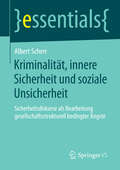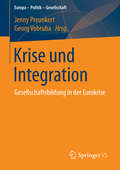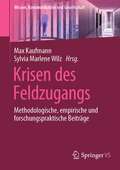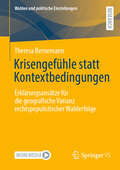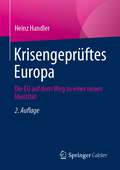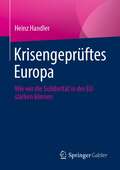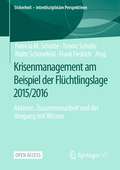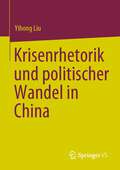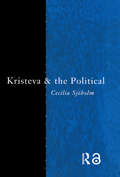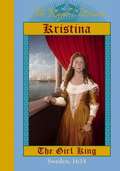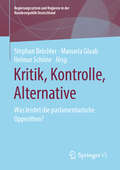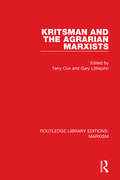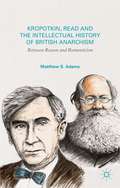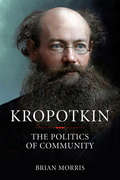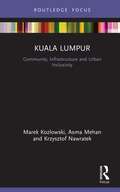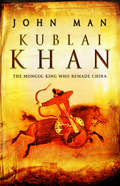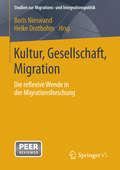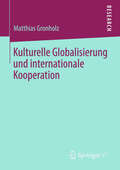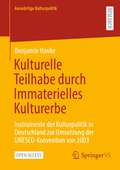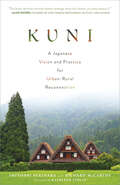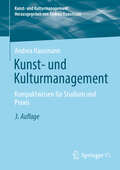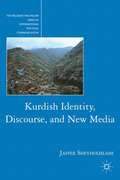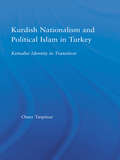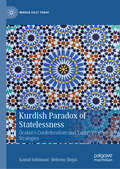- Table View
- List View
Kriminalität, innere Sicherheit und soziale Unsicherheit: Sicherheitsdiskurse als Bearbeitung gesellschaftsstrukturell bedingter Ängste (essentials)
by Albert ScherrDer vorliegende Beitrag zeigt Unterschiede zwischen neoliberalen und wohlfahrtsstaatlichen Strategien im Umgang mit sozialer Unsicherheit auf und argumentiert, dass die Entwicklung in Deutschland nicht angemessen verstanden werden kann, wenn Ähnlichkeiten zu den USA betont, Unterschiede nivelliert werden. Dargelegt wird weiter, dass kein direkter und zwangsläufiger Zusammenhang zwischen einer Zunahme sozialer Unsicherheit und steigender Kriminalitätsfurcht angenommen werden kann. In Hinblick auf die sozialwissenschaftliche Forschung wird argumentiert, dass eine einflussreiche ,Logik des Verdachts', die eine Zunahme von Kriminalität als verstehbare Folge von Armut, Arbeitslosigkeit und sozialer Ausgrenzung erwartet, problematisch ist, da sie zur Begründung von Bedrohungsszenarien beiträgt, mit denen neoliberale Konzepte gerechtfertigt werden, die soziale Sicherheit durch Ordnungspolitik gewährleisten wollen.
Krise und Integration
by Jenny Preunkert Georg VobrubaIn der breiten Debatte über die Krise der gemeinsamen Europäischen Währung steht außer Zweifel, dass sie tief greifende Wirkungen auf den Europäischen Integrationsprozess hat. Jedoch gibt es höchst unterschiedliche Auffassungen darüber, welcher Art diese Wirkungen sind. Hat die Eurokrise die Entwicklung einer Europäischen Gesellschaft gebremst oder trägt sie zur Gesellschaftsbildung bei? Gefährdet die Krise die Europäische Integration oder ist sie selbst ein wichtiger Integrationsschritt?
Krisen des Feldzugangs: Methodologische, empirische und forschungspraktische Beiträge (Wissen, Kommunikation und Gesellschaft)
by Sylvia Marlene Wilz Max KaufmannDieses Buch bietet eine ausführliche und aktuelle Auseinandersetzung mit der Frage, wie der Zugang zum Forschungsfeld gelingen kann. Der Feldzugang ist eine notwendige Bedingung, um Feldforschung betreiben zu können – gelingt der Zugang zum Feld nicht, dann ist auch die geplante Forschung nicht möglich. Das Anbahnen eines Feldzugangs ist entsprechend eine besonders kritische Phase des Forschungsprozesses, die grundsätzlich die Eigenschaft hat, krisenhaft zu sein oder es zu werden. Diesen Sachverhalt stellt der Band in den Mittelpunkt und versammelt Beiträge, die das krisenhafte Potential von Feldzugängen aus drei Perspektiven diskutieren: Erstens mit Blick auf veränderte und erschwerte äußere Rahmenbedingungen qualitativer Forschung (Der Feldzugang in der Krise); zweitens aus einer wissenssoziologischen Sicht (Der Feldzugang als krisenhafter Prozess) und drittens aus der Perspektive der Forschungsfelder und -gegenstände (Der Feldzugang als Krise für den Forschungsgegenstand?). In dieser Diskussion verfolgt der Band das Ziel, Feldzugänge sowohl unter forschungspraktischen und methodologischen Gesichtspunkten zu erörtern als auch den Feldzugang als Forschungsgegenstand zu reflektieren. Der Band gibt Anregungen für alle, die ein empirisches Forschungsprojekt durchführen wollen und für die diejenigen, die ihre eigene Forschungspraxis selbstreflexiv thematisieren. Er bietet Anschlüsse an die ethnografische Literatur, Einblicke in die Arbeit der ethnografischen Feldforschung, und er bietet wichtige Impulse für die Debatte zur Zukunft der qualitativen Sozialforschung.
Krisengefühle statt Kontextbedingungen: Erklärungsansätze für die geografische Varianz rechtspopulistischer Wahlerfolge (Wahlen und politische Einstellungen)
by Theresa BernemannIn diesem Buch werden die geografischen Unterschiede in der Unterstützung der Alternative für Deutschland (AfD) 2017-2018 untersucht. Ziel ist es, diese Unterschiede zu erklären und die zugrunde liegenden Mechanismen zu verstehen. Der Fokus liegt dabei auf dem Einfluss kleinräumiger Kontextfaktoren und der Rolle individueller Wahrnehmungen, insbesondere sogenannter „Krisengefühle“. Dabei wird der Effekt einer Vielzahl kleinräumiger Kontextfaktoren untersucht, Mechanismen zwischen Kontext- und Individualebene analysiert und mögliche Moderationseffekte von Kontexteinflüssen durch individuelle und regionale Merkmale überprüft. Die Untersuchung zeigt, dass kleinräumige Kontextfaktoren rechtspopulistisches Wahlverhalten nur begrenzt beeinflussen. Viel entscheidender sind Krisengefühle, die den Einfluss des Kontexts auf das Wahlverhalten vermitteln. Subjektive Wahrnehmungen und emotionale Reaktionen spielen somit eine zentrale Rolle bei der Erklärung der geografischen Varianz der AfD-Unterstützung.
Krisengeprüftes Europa: Die EU auf dem Weg zu einer neuen Identität
by Heinz HandlerDas Integrationsprojekt der Europäischen Union ist über seine wirtschaftlichen Erfolge noch nicht weit hinausgekommen, die ursprüngliche Idee einer politischen Union nach den Krisen des vergangenen Jahrzehnts in weite Ferne gerückt. Mit dem Angriffskrieg Russlands gegen die Ukraine ist eine Krise hinzugekommen, die Europa vor enorme innere und äußere Herausforderungen stellt und eine Neubewertung der geopolitischen sowie wirtschaftlichen Rahmenbedingungen der Europäischen Union erforderlich macht. Für die 2. Auflage wurden die Inhalte entsprechend überarbeitet und aktualisiert. Neu sind die beiden Kapitel über den Ukrainekrieg und dessen Einfluss auf die Bemühungen der Europäischen Union, die Energiekrise und den Klimawandel zu bewältigen.
Krisengeprüftes Europa: Wie wir die Solidarität in der EU stärken können
by Heinz HandlerDas Integrationsprojekt der Europäischen Union ist über seine wirtschaftlichen Erfolge noch nicht weit hinausgekommen, die ursprüngliche Idee einer politischen Union ist nach den Krisen des vergangenen Jahrzehnts in weite Ferne gerückt. Globalisierung, Migration, Nationalismus und Populismus machen der noch wenig verfestigten europäischen Identität zu schaffen. Bürgerschaft und Politik stehen vor der Wahl, die EU durch massive Reformen nicht nur wirtschaftlich, sondern auch politisch zu einer Weltmacht zu entwickeln oder sie zu einem Kerneuropa mit differenzierter Peripherie abschmelzen zu lassen. Für eine Weichenstellung bietet sich die Konferenz zur Zukunft Europas an.
Krisenmanagement am Beispiel der Flüchtlingslage 2015/2016: Akteure, Zusammenarbeit und der Umgang mit Wissen (Sicherheit – interdisziplinäre Perspektiven)
by Frank Fiedrich Patricia M. Schütte Yannic Schulte Malte SchönefeldIn diesem Open-Access-Buch werden Erfahrungen zur Zusammenarbeit und zum Wissensmanagement verschiedenster staatlicher, gemeinnütziger und privater Akteure in der Flüchtlingslage 2015/16 aufbereitet, mit praxisnahen Beispielen angereichert und um Übungen zur Vorbereitung auf zukünftige Lagen ergänzt. Die damalige Lage stellte die Beteiligten vor große Herausforderungen, sowohl im Hinblick auf Kooperationen als auch den Wissensaustausch mit anderen. Wie die Akteure damit umgingen, welche Erfolge und Misserfolge sich dabei einstellten und was sie daraus gelernt haben wird hier thematisiert.
Krisenrhetorik und politischer Wandel in China
by Yihong LiuIn diesem Buch wird untersucht, wie das politische System Chinas auf Krisen reagiert. Eine Krise ist ein Ereignis, dessen Auswirkungen nicht allein durch ein geschicktes Management von Zwischenfällen vor Ort kontrolliert werden können, insbesondere in Fällen, in denen weit verbreitete Zweifel an der Legitimität etablierter politischer Paradigmen oder der politischen Ordnung als Ganzes bestehen. Krisen können "politische Fenster" für Interessengruppen schaffen, die die etablierte Politik in pluralistischen Demokratien in Frage stellen. Der politische Kampf zwischen konkurrierenden Definitionen einer unsicheren und mehrdeutigen Situation unter den verschiedenen Akteuren verschafft ihnen einen krisenbedingten Spielraum für dramatische politische Veränderungen. Der Prozess des krisenbedingten politischen Wandels, der hauptsächlich durch die Gestaltung der Krise hervorgerufen wird, ist jedoch in nicht-westlichen Regimen wie China noch nicht ausreichend untersucht worden. Da Chinas Führung die Legitimität des "Sieges" über COVID-19 in den Vordergrund stellt und eine neue Ära der Klimakatastrophen beginnt, wird dieses dynamische Modell der Krise und der Erholung den Wissenschaftlern der chinesischen und globalen Politik Denkanstöße geben.
Kristeva and the Political (Thinking the Political)
by Cecilia SjoholmJulia Kristeva is one of the most influential French thinkers of the twentieth century and is best known for her work in linguistics. Even though her work has been very influential, the political implications of her writings have so far been neglected. Kristeva and the Political is the first book to explore the relation of Kristeva's work to the political and casts new light on her work, connecting her to recent developments in literary theory, political theory, and cultural studies. In particular it shows how Kristeva's account of the unconscious and psychoanalysis generally, widens the notion of the political.Each chapter introduces a fundamental theme in Kristeva's work, highlighting a specific period of development in her thought and drawing on texts from the 1960s through to the 1990s. Themes addressed include Kristeva's theory of discourse, the theory of the subject, the notion of alterity, feminism and marginality and her theory known as the 'politics of meaning'. Kristeva and the Political also shows how Kristeva's notions of the political draw on a rich array of thinkers and writers, from Freud, Melanie Klein and Lacan, to Proust and Marguerite Duras.
Kristina: The Girl King (The Royal Diaries)
by Carolyn MeyerMeyer offers a revealing look at Kristina, who was raised by the King and Queen of Sweden as a prince rather than a princess and assumed the throne as King at the age of 18.
Kritik, Kontrolle, Alternative: Was leistet die parlamentarische Opposition? (Regierungssystem und Regieren in der Bundesrepublik Deutschland)
by Manuela Glaab Stephan Bröchler Helmar SchöneDieses Buch schließt eine bedeutsame Lücke der politikwissenschaftlichen Forschung. Was sind Handlungsspielräume und -restriktionen der Minderheit im Parlament heute? Inwiefern gelingt es der parlamentarischen Opposition, ihre Kritik-, Kontroll- und Alternativfunktionen gegenüber der Regierung zu erfüllen? Angesichts der „Mini-Opposition“ der vorigen und einer in vier Fraktionen gespaltenen Opposition in der laufenden 19. Wahlperiode des Deutschen Bundestages gewinnen diese Fragen aktuell an zusätzlicher Bedeutung. Demokratietheoretische und empirische Analysen von Politikwissenschaftler*nnen und Einschätzungen erfahrener Abgeordneter zeigen die Chancen und Grenzen effektiver Opposition in Deutschland auf.
Kritsman and the Agrarian Marxists (Routledge Library Editions: Marxism)
by Terry Cox and Gary LittlejohnOf all the scholarly work on the countryside done in pre-1917 Russia and in the Soviet Union in the 1920s, that of L.N. Kritsman and those influenced by him – the so-called ‘Agrarian Marxists’ – is perhaps the least well known. However, that work was of extremely high quality and very original. Its significance is more than historical, since it has great relevance to the study of peasantries in contemporary poor countries – especially to the analysis of peasant differentiation. This volume, first published in 1984, has been prepared by two specialists who have been working on Kritsman and the Agrarian Marxists for several years, and will help dispel ignorance of this important body of writing. It consists of two substantial essays, and an abridged translation of one of Kritsman’s most important works: Class Differentiation of the Soviet Countryside (first published in 1926 and never before translated into English).
Kropotkin, Read, and the Intellectual History of British Anarchism
by Matthew S. AdamsAlthough marginal as a political force, anarchist ideas developed in Britain into a political tradition. This book explores this lost history, offering a new appraisal of the work of Kropotkin and Read, and examining the ways in which they endeavoured to articulate a politics fit for the particular challenges of Britain's modern history.
Kropotkin: The Politics of Community
by Brian MorrisThe 19th century witnessed the growth of anarchist literature, which advocated a society based on voluntary cooperation without government authority. Although his classical writings on mutual aid and the philosophy of anarchism are still published today, Peter Kropotkin remains a neglected figure. A talented geographer and a revolutionary socialist, Kropotkin—often known as the anarchist prince—was one of the most important theoreticians of the anarchist movement. In Kropotkin: The Politics of Community, Brian Morris reaffirms with an attitude of critical sympathy the contemporary relevance of Kropotkin as a political and moral philosopher and as a pioneering social ecologist. Well-researched and wide-ranging, this volume not only presents an important contribution to the history of anarchism, but also offers insightful reflections on contemporary debates in political theory and ecological thought, analyzing such topics as anarchist communism, agrarian socialism, and integral education; modern science and evolutionary theory; the French Revolution and the modern state; and possessive individualism, terror, and war.
Kuala Lumpur: Community, Infrastructure and Urban Inclusivity (Built Environment City Studies)
by Krzysztof Nawratek Marek Kozlowski Asma MehanKuala Lumpur is a diverse city representing many different religions and nationalities. Recent government policy has actively promoted unity and cohesion throughout the city; and the country of Malaysia, with the implementation of a programme called 1Malaysia. In this book, the authors investigate the aims of this programme—predominantly to unify the Malaysian society—and how these objectives resonate in the daily spatial practices of the city’s residents. This book argues that elements of urban infrastructure could work as an essential mediator ‘beyond community’, allowing inclusive social structures to be built, despite cultural and religious tensions existing within the city. It builds on the premise of an empirical study which explores the ways in which different communities use the same spaces, supported through the implementation of a theoretical framework which looks at both Western and Islamic conceptualisations of the notion of community. Through the analysis of Kuala Lumpur, this book contributes towards the creation of more inclusive places in multi-ethnic, multi-cultural and multi-religious communities across the world.
Kublai Khan
by John ManIn Xanadu did Kubla KhanA stately pleasure dome decreeKublai Khan lives on in the popular imagination thanks to these two lines of poetry by Coleridge. But the true story behind this legend is even more fantastic than the poem would have us believe. He inherited the second largest land empire in history from his grandfather, Genghis Khan. He promptly set about extending this into the biggest empire the world has ever seen, extending his rule from China to Iraq, from Siberia to Afghanistan. His personal domain covered sixty-percent of all Asia, and one-fifth of the world's land area. The West first learnt of this great Khan through the reports of Marco Polo. Kublai had not been born to rule, but had clawed his way to leadership, achieving power only in his 40s. He had inherited Genghis Khan's great dream of world domination. But unlike his grandfather he saw China and not Mongolia as the key to controlling power and turned Genghis' unwieldy empire into a federation. Using China's great wealth, coupled with his shrewd and subtle government, he created an empire that was the greatest since the fall of Rome, and shaped the modern world as we know it today. He gave China its modern-day borders and his legacy is that country's resurgence, and the superpower China of tomorrow.
Kultur, Gesellschaft, Migration.
by Boris Nieswand Heike DrotbohmDer Sammelband arbeitet den Beitrag von Reflexivität für das Verständnis der Beziehung von Kultur, Gesellschaft und Migration anhand von drei Schwerpunkten heraus: 1. Politiken kultureller Differenz 2. Transnationale Perspektiven 3. Ethnizität und Diversität. Dafür werden Autorinnen und Autoren mit unterschiedlichen disziplinären Hintergründen aus Deutschland, Österreich, der Schweiz und den USA zusammengeführt. Im Zentrum steht die Beziehung zwischen der intellektuellen Krise, welche die bisherigen Grundbegriffe der Integrations- und Migrationsforschung erfasst hat, und der Entwicklung neuer thematischer Zuschnitte, theoretischer Konzepte und Forschungsansätze.
Kulturelle Globalisierung und internationale Kooperation
by Matthias GronholzInternationale Kooperation lebt durch ihre Akteure. Heute kann beinahe jeder Einfluss auf internationale Entscheidungen nehmen. Matthias Gronholz beschreibt die dahinter stehenden Mechanismen und schlägt einen Bogen vom Dreißigjährigen Krieg bis hin zur Globalisierung. Er offenbart den darwinistischen Einfluss auf die Entwicklung zwischenstaatlicher Beziehungen und die besondere Rolle der Zivilgesellschaft. Die Beispiele vom Westfälischen Frieden über die Vereinten Nationen bis hin zu den G20 vereinfachen in anschaulicher Art und Weise den Zugang zum internationalen Geschehen und ermöglichen es, zukünftige Entwicklungen treffender einzuschätzen.
Kulturelle Teilhabe durch Immaterielles Kulturerbe: Instrumente der Kulturpolitik in Deutschland zur Umsetzung der UNESCO-Konvention von 2003 (Auswärtige Kulturpolitik)
by Benjamin HankeDieses Open-Access-Buch gibt einen umfassenden Überblick über die Verfahren und Abläufe der nationalen Umsetzung der UNESCO-Konvention zur Erhaltung des immateriellen Kulturerbes in Deutschland. Die Untersuchung konzentriert sich auf die Jahre unmittelbar vor und nach dem deutschen Beitritt zum Übereinkommen im Jahre 2013. Durch eine Politikfeldanalyse wird insbesondere der Frage nachgegangen, ob und wie die neue Aufgabe vom übergreifenden Ziel des Politikfelds, kulturelle Teilhabe zu steigern, beeinflusst wurde. Die Kombination aus einer Insiderperspektive des Autors mit einem analytischen Forschungsansatz dürfte für Vertreterinnen und Vertreter der Praxis des deutschen Mehrebenensystems der Kulturpolitik ebenso interessant sein wie für andere Forschende im Feld.
Kulturen des Ausnahmezustands: Antiterrorpolitik in Frankreich, Belgien und Deutschland von 2015 bis 2017
by Sophie HegemannDas Buch beschäftigt sich mit dem Einfluss politischer Kulturen auf die Antiterrorpolitik in Frankreich, Belgien und Deutschland infolge islamistischer Terroranschläge im Zeitraum von 2015 bis 2017. Im Kern geht es um die Frage, weshalb sich in Frankreich außerordentliche Maßnahmen samt Ausrufen des Ausnahmezustandes initiieren und gegenüber den Menschen im Land legitimieren ließen, während politische Akteure in Belgien und Deutschland darauf verzichteten. Um die Frage zu beantworten, hat die Autorin Interviews mit politischen Entscheidungsträgern in den drei Ländern geführt sowie Exekutivdiskurse unterschiedlicher Genres ausgewertet: Beiträge im Parlament, Regierungserklärungen, öffentliche Ansprachen, Trauerbekundungen, Pressemitteilungen, Interviewbeiträge. Auf der Grundlage einer vergleichenden qualitativen Fallstudie verdeutlicht sie, dass sich politische Entscheidungsträger bei der Wahl und sprachlichen Legitimierung von Antiterrormaßnahmen nicht nur auf rein materielle oder rationalistische Abwägungen stützen (konnten), sondern ihnen kollektive Erinnerungen an Ausnahmezustände sowie unterschiedliche Verfassungskulturen eine Orientierungshilfe für angemessenes Verhalten gaben.
Kuni: A Japanese Vision and Practice for Urban-Rural Reconnection
by Richard McCarthy Tsuyoshi Sekihara&“Reading Kuni makes me want to dive into rural Japan...this book reminds me that leaders emerge when and where you least expect it.&”— ALICE WATERS, founder of Chez Panisse restaurant, activist, and authorA guide to reviving and revitalizing forgotten places and communities through the Japanese principles of kuniKuni offers a unique model for the revitalization of rural and deindustrialized lands and communities--and shares lessons in citizen-led regeneration for all of us, regardless of where we live.&“Kuni&” is both a reimagining of the Japanese word for nation and an approach to reviving communities. It shows what happens when dedicated people band together and invest their hearts, minds, and souls back into a community, modeling a new way of living that actually works. A kuni can be created anywhere--even a hamlet on the verge of extinction--and embodies 7 key principles:Everyone is equal in a kuniKuni is equipped with a Regional Management Organization--a democratic organization that takes care of small public servicesKuni is a link between residents and repeat visitorsLife in a kuni is circular--consumption and production are in balanceKuni embraces the whole personKuni can be a place for young people who seek interconnectednessThe time for kuni is nowKuni offers a compelling vision of regenerative relationships that can take root in the United States--and anywhere. With spare and beautiful prose and useful principles for reviving rural places, this book addresses our longing for a hopeful revolution of everyday life.
Kunst- und Kulturmanagement: Kompaktwissen für Studium und Praxis (Kunst- und Kulturmanagement)
by Andrea HausmannKunst, Kultur und Management stehen traditionell in einem besonderen Spannungsverhältnis. Ziel dieses Buchs ist es, die Begriffe in Beziehung zueinander zu setzen und die wesentlichen Aspekte eines erfolgreichen Managements von Kunst und Kultur in komprimierter Form herauszuarbeiten. Dazu werden zunächst jene Rahmenbedingungen besprochen, die Einfluss auf die im Kulturmanagement Tätigen nehmen. Die anschließenden Kapitel widmen sich den zentralen Handlungsfeldern im Kulturbetrieb: Marketing, Personal, Finanzierung und Tourismus. Charakteristisch für das vorliegende Buch ist die Verbindung von theoretischen Fundierungen und praktischer Anwendungsorientierung auf Basis aktueller Beispiele aus verschiedenen Kultursparten. Durch diese Verzahnung von Theorie und Praxis eignet sich das Buch sowohl für Studierende als auch für im Kulturbetrieb Tätige. Für die 3. Auflage wurde das Buch vollständig durchgesehen, aktualisiert und um neue Aspekte in der Fachdiskussion des Kulturmanagements ergänzt.
Kurdish Identity, Discourse, and New Media
by Jaffer SheyholislamiInformed by the interdisciplinary approach of Critical Discourse Analysis (CDA) and theories of identity, nation, and media, this study investigates the ways Kurds, the world's largest stateless nation, use satellite television and Internet to construct their identities. This book examines the complex interrelationships between ethno-national identities, discourses, and new media. Not only does this book offer the first study of discursive constructions of Kurdish identity in the new media,this book is also the first CDA-informed comparative study of the contents of the two media. The study pushes the boundaries of the growing area of studies of identity, nationalism and transnationalism, discourse studies, minority language, and digital media.
Kurdish Nationalism and Political Islam in Turkey: Kemalist Identity in Transition (Middle East Studies: History, Politics & Law)
by Omer TaspinarThis text is an attempt to study Turkey's national and secular identity in light of the challenges posed by Kurdish nationalism and political Islam.
Kurdish Paradox of Statelessness: Öcalan's Confederalism and Turkeyification Strategies (Middle East Today)
by Kamal Soleimani Behrooz ShojaiThis book critically examines Abdullah Öcalan’s proposal of "democratic confederalism," introduced in 2005, and its theoretical and practical implications. Despite its claims to transcend the nation-state model, Öcalan’s project leaves the colonial structures of the Turkish, Persian, and Arab states unchallenged, legitimizing their assimilatory and genocidal tendencies. It fails to secure Kurdish self-determination or protect linguistic and cultural rights, including mother-tongue education. The study interrogates these contradictions, offering a comprehensive critique of Öcalan’s ideology and its limited impact on governance, Kurdish identity, and aspirations for autonomy. Drawing on Öcalan’s original Turkish writings, the book challenges prevailing scholarship that often relies on selective translations and sympathetic interpretations. It reveals the foundational limitations of Öcalan’s approach, exposing the structural barriers it sustains and its complicity in perpetuating Turkification tendencies under the guise of Kurdish politics.
